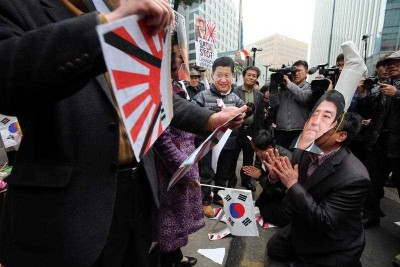
Many expected Japan–Republic of Korea (ROK) relations to be reset when the Shinzo Abe and Park Geun-hye administrations first came to power, but the past two years or so have seen further deterioration and pessimism.
June 2015 will mark the 50th anniversary of the normalisation of diplomatic relations between the two countries, offering a perfect opportunity to construct a shared long-term vision for Japan–ROK relations. Especially now, when challenges abound between the two, the achievements of the past 50 years since normalisation should be affirmed and a vision formulated for the future.
Endeavours to that end must begin with the following three points.
First, unceasing efforts must be made to restore trust between Japan and the ROK and deepen bilateral strategic dialogue,communication and mutual understanding. There has been a worrying halt of nearly three years in Japan–ROK summit meetings — the last one took place in May 2012 between former Japanese prime minister Noda Yoshihiko and ROK president Lee Myung-bak in Beijing.
A growing number of experts are abandoning any hope for a meeting under the Abe and Park administrations. But the deterioration in Japan–ROK relations is not due solely to the personalities of the two leaders. It stems in great part from changes in the international political structure and regional power balance in East Asia.
In particular, differing perspectives on the rise of China have destabilised relations. Japan views China as a military threat in part due to the Senkaku/Diaoyu Islands issue. The ROK in turn has seemingly begun to view Japan’s security posture vis-à-vis China as a potential threat.
In a 2014 opinion poll by Asahi Shimbun, the top responses in Japan to the question of which ‘country do you feel poses the greatest military threat’ were China at 55 per cent followed by the Democratic People’s Republic of Korea (DPRK) at 29 per cent. Respondents in the ROK put the DPRK first at 65 per cent, Japan second at 20 per cent and China third at 10 per cent.
When asked ‘which do you consider more important for your country, the US or China?’ in another 2014 joint opinion poll by Yomiuri Shimbun and Hankook Ilbo, Japanese heavily favoured the US (74 per cent) over China (14 per cent), while South Koreans were nearly evenly split between the US (47 per cent) and China (46 per cent). These disagreements are causing a divergence in security policy and mutual distrust between Japan and the ROK.
Political leaders and diplomats in both Japan and the ROK should, as quickly as possible, seek to enhance bilateral cooperation. This requires frank dialogue to foster understanding of each other’s foreign and security policies. Japan and the ROK should consider conducting the usual vice-ministerial strategic dialogues at a higher level by, say, holding regular meetings between top Japanese and ROK security policy officials, such as that held between National Security Council Secretary General Yachi Shotaro and National Security Office Chief Kim Kwan-jin in October 2014.
Second, gaining the understanding of the general public is essential to further develop Japan–ROK relations. Both countries’ leaders need to speak to their respective constituencies more enthusiastically and openly about the importance of good relations and cooperation. The deterioration in sentiment toward the ROK is especially serious in Japan, with a 2014 Cabinet Office poll showing the proportion of Japanese who do not feel an affinity with the ROK is at an all-time high of 66 per cent. The ‘fatigue’ they feel when the ROK raises historical issues continues to cause many Japanese to lose sight of just how important relations with the ROK are.
The time has come for political leaders to distance themselves from short-sighted, emotionally loaded arguments and to highlight the importance of good long-term relations with their neighbours. The Japanese cabinet made this clear in December 2013: ‘The ROK is a neighbouring country of the utmost geopolitical importance for the security of Japan. Close cooperation with the ROK is of great significance for peace and stability in the region’. Japan holds the same importance for the ROK. Therefore it is incumbent upon the political leaders of both countries to explain the vital importance of the relationship to their respective publics more candidly and persuasively.
Third, diplomacy on controversial historical issues is vital. Diplomacy is not a time for obstinacy but rather one when mutual compromises are made to gradually uncover points of equilibrium. But Japan must supplement bilateral diplomacy with persuasive arguments at home and clear explanations internationally.
Japan addressed the so-called ‘comfort women’ issue wholeheartedly in the 1990s by, for example, establishing the Asian Women’s Fund, but its communications on the issue both at home and abroad have proved insufficient. Unfortunately, Japan’s past efforts are almost entirely unknown and therefore unrecognised in the ROK. As the ‘comfort women’ issue has been treated as a human rights issue since the early 2000s, Japan’s approach needs to be even more conscious of the opinions of the international community.
Japan and the ROK should explain domestically and internationally that they respect the decisions and efforts made thus far and they will aim to resolve issues in accordance with internationally-agreed rules. They should also affirm that they will jointly, calmly and constructively address the destabilising impact of nationalism in East Asia.
Mutual criticism and persistent assertiveness are not conducive to joint action. At the same time, historical issues do not constitute the whole of Japan–ROK relations; the political leaders of Japan and the ROK should firmly commit to expanding exchange and cooperation in various endeavours. Even while earnestly addressing the past, we must not lose sight of 50 years of diplomatic cooperation designed to ensure future peace and prosperity.
This article has been republished from Eastasiaforum.org.